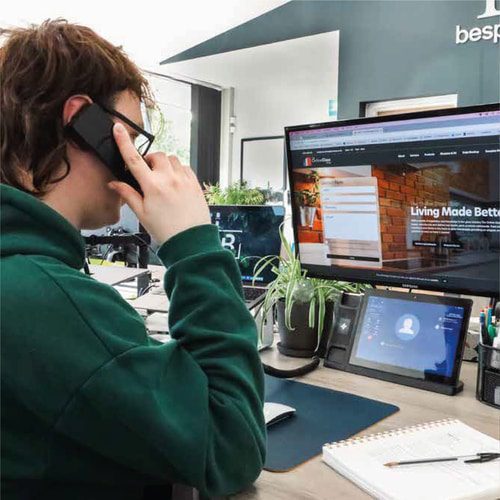
Designing an Effective Online Store for eCommerce Success
In an era where digital shops are becoming the mainstay of retail, eCommerce web design has surged to the forefront of the business world. This shift has not only transformed how we shop but also redefined what it means to create a compelling online shopping experience. As we navigate through the vast expanse of eCommerce, the design of an online store emerges as a pivotal element that can make or break a business. It’s not just about having an online presence; it’s about crafting an experience that is intuitive, engaging, and, most importantly, effective in driving conversions.
The Rise of eCommerce and User Experience
The growth of eCommerce is a testament to the changing consumer behaviour and technological advancements that have made online shopping not just a convenience but a preference for many. In this digital shopping realm, the user experience (UX) your website offers is crucial. A well-designed eCommerce website goes beyond aesthetics, focusing on providing a seamless, user-friendly shopping journey that guides visitors from their first click to the final checkout.
Simplifying Navigation for Easy Product Discovery
The cornerstone of an effective eCommerce site is intuitive website navigation. Customers should be able to find what they’re looking for effortlessly. This means having a clear, well-structured menu, logical categorisation of products, and a layout that highlights key offerings. Simplified navigation not only enhances the shopping experience but also encourages exploration and discovery.
Enhancing Search Functionality and Filtering
A robust website/product search feature, complemented by comprehensive filtering options, allows customers to refine their product search based on specific criteria. This functionality is particularly important in stores with a wide range of products, enabling users to quickly find items that match their needs, thereby improving the overall shopping experience.
Designing Compelling Product Pages
Product pages are the heart of your eCommerce site. High-quality images that showcase products from multiple angles, accompanied by detailed and engaging descriptions, give customers a clear understanding of what they’re purchasing. Additionally, incorporating elements such as zoom functionality and customer reviews can further enrich product pages, making them more persuasive and informative.
Streamlining the Checkout Process
A smooth checkout process is critical in minimising cart abandonment rates. This involves reducing the number of steps to purchase, offering multiple payment options, and clearly displaying security badges to reassure customers that their transactions are secure. Simplifying the checkout process ensures that once customers decide to make a purchase, they can do so with ease and confidence.
Incorporating Trust Signals
Trust signals, such as customer reviews, secure payment badges, and clear return policies, play a significant role in building customer confidence. These elements reassure shoppers of the quality of your products and the security of their purchases, which is vital in fostering trust and loyalty in an online setting.
Prioritising Mobile Optimisation
With a significant portion of online shopping occurring on mobile devices, optimising your eCommerce site for mobile is non-negotiable. A mobile-friendly design ensures that your site is accessible and easy to navigate on any device, providing a consistent shopping experience that can significantly impact conversion rates.
Conclusion: The Art of eCommerce Design
Designing an effective online store is an art that requires a deep understanding of user behaviour and preferences. The key considerations in eCommerce web design, from intuitive navigation and robust search functionality to compelling product pages and streamlined checkout processes, all converge to enhance the user experience. This, in turn, plays a crucial role in driving online sales and fostering customer loyalty.
As the digital landscape continues to evolve, the importance of investing in professional Manchester web design services for your shop cannot be overstated. In a market where competition is fierce, a well-designed eCommerce website stands as a testament to your brand’s commitment to quality and customer satisfaction. At Blue Whale Media, we specialise in creating eCommerce solutions that not only meet but exceed the expectations of today’s discerning online shoppers. Let us help you navigate the complexities of eCommerce, crafting an online store that is not just functional but truly remarkable.
Frequently Asked Questions about this blog
1. Why is intuitive navigation important for an eCommerce site?
Intuitive navigation is crucial for an eCommerce site because it enables customers to find what they’re looking for quickly and effortlessly. A well-structured menu and logical product categorisation enhance the shopping experience, encouraging exploration and discovery, which can lead to higher engagement and sales.
2. How can enhanced search functionality improve my online store?
Enhanced search functionality, along with comprehensive filtering options, allows customers to refine their searches based on specific criteria. This is especially important for stores with a wide range of products, as it helps users quickly find items that match their needs, significantly improving the overall shopping experience.
3. What makes a product page compelling?
A compelling product page includes high-quality images from multiple angles, detailed and engaging descriptions, zoom functionality, and customer reviews. These elements give customers a clear understanding of the product and its benefits, making the page more persuasive and informative.
4. How does streamlining the checkout process impact customer behaviour?
Streamlining the checkout process reduces cart abandonment rates by minimising the number of steps to purchase, offering multiple payment options, and displaying security badges to reassure customers. A simplified checkout process ensures that customers can make purchases with ease and confidence, positively impacting conversion rates.
5. What are trust signals, and why are they important for eCommerce sites?
Trust signals, such as customer reviews, secure payment badges, and clear return policies, are crucial for building customer confidence. They reassure shoppers about the quality of the products and the security of their purchases, fostering trust and loyalty in an online setting, which is vital for long-term business success.
6. Why is mobile optimisation critical for online shopping success?
Mobile optimisation is critical because a significant portion of online shopping occurs on mobile devices. A mobile-friendly design ensures that the site is accessible and easy to navigate on any device, offering a consistent shopping experience that can significantly impact conversion rates and customer satisfaction.




